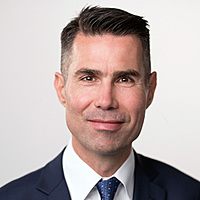Equity investors - don't lose sight of what you actually own
If you own an equity, you are a part owner of a business. The value of what you own is a function of its income into perpetuity. If you don’t lose sight of this you will make better decisions and keep your head while others lose theirs.
As an equity investor, you have a fractional ownership of a business. That is the essence of a ‘share’. If you own an index you own ‘a bit of every listed company’. If you are an active equity investor you have made discrete choices and own parts of a selection of businesses. Either way, you do not own a unit of economic activity. What you own is a business.
The value of what you own is not a function of this year’s earnings, it is a function of the particular business’ earnings from here off into the sunset. Let’s explore this. Imagine we have a business generating cash earnings to owners, after making all necessary investments to grow the business, of $100. We might ascribe a value to this business of $2,500, equal to 25x cash earnings, or a 4% cash yield. If 2020 is a particularly poor year for this company and it earns just $50, but expectations for future earnings are unchanged, how much does it matter? Well, not much. Taking $50 off the totality of cash we will receive over the life of the business impacts its current value by just 2%. Perhaps after a particularly weak year you get an unusually strong year – that is the nature of business cycles – and the lifetime cash earnings of the business change a lot less than $50.
As equity investors, and therefore as business owners, the question you should ask is not whether the economic externalities make a business earn less this year, but whether they make a business be worth less. What sort of businesses may have their value materially impacted by a weaker economy in 2020? Banks and insurance companies are one category, where interest rate spreads may decline for an extended period if central banks reduce rates, while losses on loans and junk bonds may rise. Businesses with an onerous amount of debt, who may find it difficult to refinance debt into stressed credit markets. Energy and material companies and other cyclical businesses, who may incur operating losses in a down cycle and have to pare back on necessary investments in their business. At Aoris, we avoid these types of businesses, and others that we deem ‘fair weather’, all the time.
We like to own 'all-weather' businesses where the impact of economic externalities on the value of the business is minimal. How can we demonstrate 'all-weather'? Every business we own remained highly profitable through the GFC, and none cut their dividend or raised fresh equity capital. Take Nordson, a maker of precision dispensing equipment, essential to the construction of your iPhone, among many other applications. It has increased its dividend for 56 consecutive years. Or Halma, a maker of products used in safety applications, such as gas and flame detectors, which has increased its dividend by more than 5% every year for the last 39 years.
We own high quality, wealth creating businesses whose value is steadily increasing. This does not mean their earnings must rise every year. Further, we like to own businesses that are the strongest in their market and that are willing and able to invest through periods of stress and come out with their competitive position enhanced.
Take CDW as an example, which is the largest IT reseller in the US, helping 250,000 medium-sized businesses with their IT needs. CDW is larger than their next four competitors combined, and as such a very valuable partner for hundreads of IT vendors. During periods of supply disruption, such as for certain Intel chips over the last year, CDW has proven able to access supply-constrained product and continue to serve its customers and take market share.
Or take Nike, which increased its spending on selling and endorsements in 2009 and again in 2010, helping increase its market share in those years, and every year since.
Or, lastly, take the straight-talking management of Graco, a Minneapolis-based world leading in highly-engineered fluid management equipment, like professional paint sprayers, pressure washers and fuel pumps. The CEO said last October ‘we don’t intend to cut our engineering groups or cut our sales teams. When you start a product development project, we’re talking about 12-24 months. To stop these things really doesn’t make a lot of sense. It might make a quarter or two look better, but I don’t think that it’s the right long-term move for our shareholders or for the company. We used this strategy when things went to hell in 2008 and we feel really good about how we came out of that’.
So, the equity market in aggregate (the herd) may feel more positive or negative about economic activity based on the day’s headlines. Don’t lose sight of what you own, which is a business, and the value of that business is a function of its earnings into perpetuity. If you own businesses that have proven to be highly profitable each year through the economic cycle, are conservatively financed and sensibly managed, you can be confident that the value of the business hasn’t changed materially in the last month. Where prices have declined, it makes this value more attractive. This is the essence of sensible investing.

